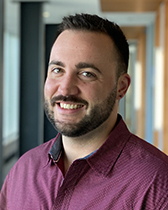Staff Spotlights: Ben Owen

By Irena Garic
Where are you from, and where did you grow up?
I was born and raised in Illinois, Springfield, IL to be specific. I have lived in the Midwest almost my entire life (except for 2 years after graduating graduate school working in the Boston area).
Tells us more about how your career path led you to Northwestern University?
I went to undergrad at University of Illinois at Springfield, where I changed from a pre-med major to a Chemistry major to follow my favorite subject and passion. While completing my undergraduate, I found that I enjoyed all aspects of analytical chemistry the most, and as such, I subsequently decided to go to Purdue University, the #1 ranked analytical chemistry graduate program, to earn my PhD. I joined a mass spectrometry-focused group under Dr. Hilkka Kenttämaa’s mentorship. In her group, I built novel MS instrumentation and analytical methods for analyzing lignocellulosic biomass. Upon completion of my PhD, I joined Agilent Technologies, Inc. (one of the main LCMS vendors) as an applications scientist and Product Specialist for Mass Spetrometry. At Agilent, I helped customers (1) make buying decisions through developing and demonstrating methods and instrument performance that helped answer their research questions, (2) deliver onsite training on how to use the instruments and software, and (3) performed custom installations and custom workflow setups and training for specific application uses, like metabolomics, clinical assays, and/or mass spectrometry imaging. After transferring from the Boston area in 2014, my partner (who was a post-doc in Stupp lab) and I settled in Chicago more permanently after he got a job at DePaul University. He is an organic chemist and teaches and runs an undergraduate research group there. In the summer of 2019 when the IMSERC Director position opened up, I decided it was time for a career switch and to get try to get back into a more heavy research and teaching environment, like academia. I feel very fortunate to have found NU and my role in IMSERC.
What is your favorite thing about being a director of IMSERC?
My favorite part is being an integral part of the process that helps facilitate the amazing and high-quality research being done at Northwestern. As an analytical chemist, I am definitely highly interested in measurement science and the data created as a result, with mass spectrometry obviously taking a special place. However, I was not personally driven to be in the lab daily myself or run a principle investigator lab. In graduate school, I enjoyed most the teaching and mentoring opportunities I got through being a TA and senior graduate student, and I have since found that being in an educational environment and having the ability to help train and educate people on concepts within analytical measurement are definitely the key rewarding parts of any job role I have. As IMSERC and MS Director these aspects are central to my job description.
What are your current research interests / projects and tells us little bit about that?
Currently, IMSERC mass spectrometry subject area (of which I am Director, in addition to IMSERC) is undertaking the development of mass spectrometry imaging (MSI), metabolomics/MetID, and clinical chemistry assays. MSI allows you to take a MALDI spectrum and repeatedly fire the laser in a raster scanning way, wherein each laser spot is a pixel. Masses can then be mapped to a pixel and an image created, being able to be done with both material substrates and biological samples, such as tissue sections, embryos, cells etc. Metabolic and MetID assays being currently investigated range from completely untargeted methods (simply profiling compounds in blood, urine, or other biological fluids), as well as looking for specifically metabolism of exogenous compounds (like drugs) being fed into a biological system. This is probably the project in its most early stages within IMSERC. Finally, clinical chemistry assay development projects currently focus on developing endogenous assays typically associated with endocrinology to help medical school researchers probe patient phenotypes and determine metabolic expressions of disease or healthy state.
What would you do (for a career) if you weren’t doing this?
If I wasn’t working for NU at IMSERC, I would likely be a chef. I love to cook and love to do it even more so for others.
If you could meet anyone, living or dead, who would it be and why?
Ella Baker, prominent civil and human rights activist, has consistently made it to the top of my list. I greatly admire the people that fought for our country to continue to be a more equitable and inclusive place to live, especially ones leading beyond their time and the current zeitgeist. Ella was definitely a leader and revolutionary for a better and more inclusive and equitable world, leading along side some of the most noted civil rights leaders of the 20th century, including W. E. B. Du Bois, Thurgood Marshall, and Martin Luther King Jr. My favorite quote of hers is: “One of the things that has to be faced is the process of waiting to change the system, how much we have got to do to find out who we are, where we have come from and where we are going.” To me this means, while yesterday does define us, it doesn’t have to dictate who we are tomorrow and with what patience we must endure to be the “better versions” of ourselves or as a society.
What is the first thing you will do after quarantine restrictions are lifted?
Travel some place that’s been neglected from my list, likely with good friends. I love to travel, explore new places, and make new memories. It is probably what I miss the most having been in quarantine.
